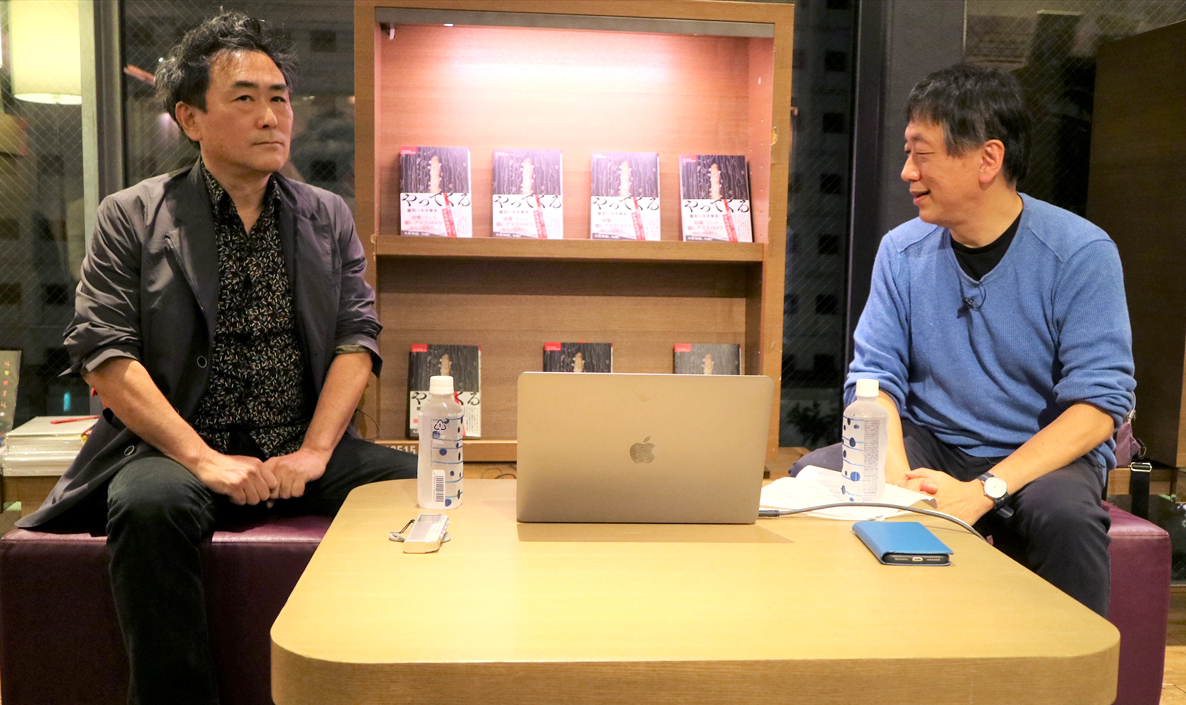[Event Report] Talk event between Pegio Gunji and Shinji Miyadai, "Towards a World of Uncoolness and Uncoolness" Transcription ⑤
~The background to the mass production of closed humans~
Miyadai: (laughs) I have a slightly different view from Gunji-san. Mayor Giuliani was able to successfully clean up the environment in New York and significantly raise land prices because he followed the "broken windows theory." The theory is that if there are houses with broken windows or walls with graffiti around you, people will behave illegally without a second thought. However, if you get rid of the broken windows, erase the graffiti, and clean up the city -- this is called gentrification -- people will stop littering without being told to do so, and there will be no more robbers. This is a proven theory.In comparison, it was certainly chaotic in the past, and not only was garbage dumped in the river, but large companies like Chisso (the company responsible for Minamata disease) dumped mercury into the ocean, and many other unfortunate events occurred. It would be an absolute good thing if that were to disappear, but we are closed off inside what people call order, in the "broken window theory" way. It is a passive automatism. It is not like being ordered to do something and following it out of necessity. It is a proven mental mechanism that makes it impossible to do dirty things when the surroundings are clean. This is why we are increasingly unable to have the experiences that Mr. Gunji and I had. I think that this is one of the reasons why we are closed off inside the framework of conditional program-like artificial intelligence.
Gentrification is literally "people-friendly," so it will probably extend people's lifespans and overcome various illnesses, but it will be closed off by the space-time of words, laws, and profit and loss, and the opportunity to open up to the "radical passivity" you just mentioned will disappear. "Radical passivity" is not a case of someone being active and you being passive, but is closer to what the ancient Greek grammarian Diodnios Thrax (2nd century BC) called the middle voice. In fact, just as the concept of middle voice has been lost to us in modern times, I think that the number of people who do not know the pleasure of the "radical passivity" that Mr. Gunji talks about is increasing, and will continue to increase.
As a result, it seems that the repetition of the neurotic frame problem of忖度 is mass-producing "those who show symptoms" who think they have filled the gap. Of course, that is exactly why the contemporary recognition that "this is wrong" -- the contemporaneity I mentioned earlier -- is also clearly emerging. So, looking at that aspect, I think Gunji is right. In that regard, I think it's symbolic what editor Shiraishi said earlier when he said, "It seems like about 10% of the people who read it understand it well."
Isn't that the same as the demographic ratio of ASD (Autism Spectrum Disorder)? (laughs) I have ASD too, and from what I've seen, I think Mr. Gunji is the same way, if I may be so rude (laughs). The reason why it's 10% is explained by evolutionary biology. When everyone says "It's dangerous, let's not go," having 10% of people who say "Is it dangerous? Then I'll go" (laughs) increases the survival rate of the group, and therefore the survival rate of individuals. But if there are more than 10%, it gets in the way of "being closed off to words, laws, and profit and loss," which are the conditions for settlement (laughs).
That's the explanation, but I think it's mostly correct. The reason why that 10% started speaking out is because of contemporaneity. The reason why that 10% started speaking out is because they were oppressed and their roles that were given to them in the past were taken away by the "generalized systemization" that came as a result of the civilization that used science without thinking. In that sense, it's natural that the 10% will understand this book, but I want to ask what on earth the remaining 90% are (laughs).
For example, I feel like I can hear people saying that "Yaruteru" couldn't be written in a more understandable way, rather than just a parade of strange experiences that only Gunji could have, but there would be no point in doing that. What's important is that there are people who read "Yaruteru" in this strange way and say "Ah," and are saved. Conversely, I want those who say "What is this?" to just die (laughs). To put it mildly, it's not that Gunji's writing style is bad, so it's not that people can't understand it, but that those who don't notice anything from this deliberately chosen writing style are no good. Because the reasons why it's no good are clearly written, aren't they? That's why it's a perfect book.
This reminds me of the story of ants. 10% of ants behave irregularly, but if you remove 10% of them, the remaining 90% will become whole, and the remaining 10% will behave irregularly again. This is a well-known tendency, isn't it? In the same way, if you remove 90% of a 9:1 population and leave only 10%, after the remaining 10% become whole, 90% of them will behave regularly and 10% will behave irregularly. However, it has not yet been observed whether this tendency will continue forever, and in fact it is not possible to observe forever.
In my opinion, the direction we are heading in now is as follows: one of the nine to one is removed, and the remaining 90% becomes the whole, and then another 10% is removed, and then the remainder becomes the whole, and then another 10% is removed... If this process continues, people with a sharpened natural intelligence like Mr. Gunji - "fundamental passivity" that receives what "comes" - will never disappear, but the performance of the "remaining 10%" will steadily decline. It's a bit like the telomeres (repair genes) of the male Y chromosome, which get shorter and shorter with each generation.
It hasn't been academically observed yet, but I think that's the case when you consider the fact that our civilization is inherited not by genes, as Dawkins puts it, but by memes (cultural mimics). So, even if there is a short-term movement like the one Gunji mentioned, "voices are rising," if you look at it from a macroscopic history of civilization, even if such things have happened in the past, I think it was just a momentary whirlpool in the huge flow. That being said, what do you mean when you say things are getting better?
~ Beings with Sensitivity ~
Gunji:It's sad that 10% of the world is being culturally eliminated and weakened. However, I am not optimistic about the fate of humanity. I think that this tendency of civilization to ignore the outside world and to destroy the world by only considering what it can recognize as the world, such as the world being where there are roads, has reached an unsolvable dead end.However, I wonder if things have always been good so far. I even feel that academia has always only done pseudo-externalization of the outside. Thinking means not allowing for an outside that cannot be understood, and trying to explain everything. Even if this is not possible, it posits the outside and structures the relationship with the known. In that sense, it tries to explain everything. That may be the fate of thinking.
I also wrote about this in the afterword to Yattekuru, where I presented two typical attitudes toward the problem of how to relate first person and third person, a problem that modern science and philosophy deal with, through the world-type (chunibyo) and fujoshi. World-type people are people who believe that relating the two is the answer, and in fact even philosophy takes this attitude. In contrast, fujoshi leave the problem of first person and third person hanging in the air, carrying the antinomy as a trauma, and admire the outside world through that gap.
For fujoshi, the first and third person may be themselves and the manga author, but in any case, I think that the attitude of neither viewing this issue objectively nor participating as a party is a new attitude towards the outside that has not appeared before. For queers in the LGBT community, the first and third person may be the party and gender as an institution. In any case, isn't it a new attitude towards the outside, of carrying and polishing trauma as an antinomy? I even think that this may be a chance to turn things around for humanity, which is likely to come to an end as it repeats the cycle of "ignoring the outside" and "noticing the outside and pseudo-externalizing it." As a full-scale deployment of "coming" in society.
Miyadai: I see. That makes sense. However, I think that it's only because the phenomenon has become more extreme that people are becoming more sensitive, and in reality, polarisation is progressing. For example, even among those who advocate feminism or LGBT, there are some who naturally follow the "power that wells up from within = virtue". I think that being driven by the "power that wells up from within" rather than by words, laws or profit and loss, and receiving something that "comes" from the outside, are logically the same thing. That's because the "outside" that Gunji speaks of is not a concrete everyday spatial concept, but a logical abstract concept.
While there are such open-minded people, there are also mass-produced automatons who live their lives saying things like "Society is the age of feminism" or "It's the age of LGBT" and then "I'm going to complain" or "I have to comply". As far as I can see on the Internet, the latter type is more likely to be mass-produced. As I mentioned in my recent article on Yukio Mishima in the Nikkei Shimbun, overnight, Japanese people went from Emperorists to democrats, and overnight they become feminists and LGBT people. "People who become like that overnight" are the trash who are always trying to please others, as criticized by Mr. Gunji. That's why I don't think we should be optimistic just because of the apparent volume of their voices. What do you think about that?
*How to fill the "empty Japan" - Sociologist Shinji Miyadai asks Yukio Mishima 50 years later Nihon Keizai Shimbun, morning edition, October 21, 2020
https://www.nikkei.com/article/DGXMZO65222430Q0A021C2BC8000/
Gunji:I understand what you are saying very well. Of course, in the sense that Miyadai uses, intrinsic rather than spontaneous is an attitude of accepting what "comes". On top of that, I also understand that there are many people who do the same thing, but act based on profit and loss calculations, rather than acting intrinsically. I said earlier that the sense of touch that originates from affordances and Merleau-Ponty can sometimes function as an interface, but this is very common when it pseudo-externalizes the outside. However, even though it can't be helped that only about 10% of people are open to what "comes", such people are in the minority, so there is no need to think "I'm no good anymore, I can't survive in society like this", but rather just hone and develop your sensitivity. No matter how you look at society, that 10% will bring about some kind of change, right? And this externality may be our last chance.
Let's think about the origin of 0. First of all, the numbers 1, 2, and 3 are meaningful because there is a premise that counting outside of them has meaning, and this is implicit. It's the unwritten enclosure mentioned at the beginning. We can think of it as a norm that does not need to be entered, but in reality, something even more amazing happens. Outside of the norm, that is, the outside where even the meaningfulness of counting is not made explicit, is made explicit as the meaningfulness of "not counting", and when this is further symbolized, the number 0 appeared. Such amazing things can happen by noticing the outside. This is the driving force behind changing the world and transforming society, and it is done by people who are thoroughly sensitive to the outside. Even if the same experience is experienced, only 10% of people will develop trauma, so it is inevitable that only about 10% of people are sensitive and have antinomy. However, 10% is a considerable number, and if we can create a society where these people can hone their powers without hesitation, society may not sink.
Miyadai: It's a wonderful form of empowerment (laughs). People who find it difficult to live in this society have no reason to feel inferior. It means that we who find it difficult to live are the ones who are right. It means that those who adapt to this society and seem to be living happily are the ones who are the scum -- and these are my words, not Gunji's (laughs) -- who are the scum. I really gained strength from this. It's true that I have ASD. That's why I find it difficult to live and I have all kinds of symptoms. But I've always thought that the mentality that we have to fix that is strange. I think whether it's difficult to live or not is up to society.
In such a shitty society, that is, a society that erases the outside of words, laws, and profit and loss, or a society that erases excess and deficiency, it is natural that various symptoms arise due to repression, and as Mr. Gunji said, improving the interface and curing it is definitely just concealment. In that case, we should explore the possibility of utilizing trauma in a different way while leaving it as trauma.
Behind the symptoms are social problems, and when people readjust and heal in a problematic society, the social problems are hidden. Freud and Lacan were the first to notice this problem, but Weber, a sociologist from Freud's time, also noticed the same problem. He described it as the problem of "depersonalization," which is a problem of people, and the problem of "iron cages," which is a problem of society. The more people adapt to a society that has become an "iron cage" -- a rational society where everything is predictable -- the more they become "depersonalized" and lose their power. The conceptual system is also a diagram influenced by Nietzsche, who was a contemporary of his, and attempted a renaissance of early Greece, which emphasized the "flow of power." The power referred to here is usually conceptualized as "virtue," but as I said earlier, it is something that "comes."
~Question and Answer session~
Questioner 1: So, by radical passivity, you mean a phenomenological perspective? If so, that makes perfect sense to me.Gunji: The radical passivity, the complete passivity that you are talking about here is the complete bleaching of the traumatic and opening up sensitivity to the outside of the so-called phenomenological world of perception, so that is different. Agamben's Bartleby, mentioned earlier, is a good reference.
Miyadai: I see. To understand the passivity that Gunji-san also talks about, it would make sense to glance at the various discussions on the middle voice that have been inspired by Kokubun-san's discussion of "The World of the Middle Voice" since his book, including my own discussion. The middle voice is exactly about being open to the flow of power, and women have an advantage over men. Why are women more likely to exert superhuman strength in an emergency, that is, to enter an altered state of consciousness? Why are women more resistant to stress? Why do women live longer? It's because consciousness and genes refer to the phenomenon of pregnancy. Kokubun-san doesn't talk about sexual matters, so he doesn't say, "The middle voice is pregnancy," but because of that, it tends to be difficult to see the "flow of power," or "coming."
There is no middle voice as familiar and amazing as pregnancy and childbirth. I have been present at the birth of three children, and my wife gives birth without being able to choose what gender the child will be, what kind of personality the child will have, what kind of appearance the child will have, what kind of talents the child will have, whether the child will be healthy even though we should be careful about how we express it. This is what Mr. Gunji calls being open to what is "coming" = middle voice, and what I call "passive active" = middle voice. Of course, you all already know that there are movements to enable choice through prenatal testing and movements to actively oppose pregnancy such as antinatalism -- including the existence of movements against these -- but in most cases pregnancy is "open to what cannot be chosen." I have written in my film reviews that it is a "resolve" that is opposed to "wandering around."
If we mix Gunji's and Miyadai's terms, then "preparation for radical passivity" = "passive active" = middle voice. The discussion of death at the end of "Coming" is easy to understand. Since the other person is active and you are passive, you cannot reverse the relationship with death and have the other person be passive and you be active. As Gunji writes, "preparation for radical passivity" is only possible when we wait for "coming" = "a visit from the world", if we mix the terms. This is also related to Walter Benjamin's concept of "constellations that emerge for a moment in the midst of shattered rubble" = allegory (the arrival of something that cannot be defined by symbols). Something "coming" opens us up to "radical passivity". In fact, Benjamin also refers to early Greece.
Questioner 2: I have a younger brother, and we happened to both read "Yatte Kuru". I understood it pretty easily, but my brother didn't quite get it. I think I'm in the 10% group, as you said earlier, but I think it's not because of me, but because of my girlfriend. I just have to get through it as I go about my daily life, but what should the people in the 90% group do? I feel like I was saved by her, so it's fine for me, but will those who can't open up live their whole lives alone? It's painful to watch, so what should I do?
Gunji: It's not a story about being saved by her or not being lonely forever, is it? (laughs) It is rather possible to accept the outside while being separated from everything. For example, Nakamura-san, a Japanese painter who drew the cover of "Yattekuru", has said that the Gnostic "rejection of the world" is very important since ancient times, and at first I wondered what he meant. "Rejection of the world" sounds like rejecting everything and isolating yourself, but that's not the case. It is only by cutting ties with society that is connected to easy-to-understand relationships that you can accept the true externality that lies outside of it. It is opened up by solitude, so I feel that there is a slight difference between a story about accepting externality and a story about being saved by something specific (laughs).
Miyadai: Gnosticism is one of the themes of the seminar, and Jung hit the nail on the head in his later years. What people call "God," "Holy Spirit," "Jesus," and "people" are merely things that people imagine and experience while living in society. All religious representations are "internal expressions" -- "internal images" that Gunji expressed using mathematical formulas when he was young. Jung said that Jesus, who tells people who lament "Where is God" after a series of misfortunes, "God is always with you," is actually linked to Gnosticism. I completely agree. Gnosticism encourages society and the world, which are inevitably closed off by such internal expressions, to open up to the outside of internal expressions -- to "what is coming" -- by recognizing the miracle of actually being alive.
On top of that, Gunji adds that natural intelligence, or the ability to be open to what comes your way, is something that everyone has, and that it actually works in every kind of perception and recognition. That's the first important point. There's another point. It's true that the number of people who seem to be profit-and-loss machines or consideration-machines is on the rise, but there are two types of them. One is people whose abilities have been thwarted, as if they've "adapted" while pretending to adapt, even though they actually belong to the 10%. The other is people whose abilities have deteriorated, which causes even more damage. These two are similar but different. I feel this deeply from my experience in workshops.
What I do in my workshops is, first, to quickly distinguish between "people whose abilities are thwarted" and "people whose abilities have deteriorated." Secondly, to gain know-how while thinking about what kind of experience to design for "people whose abilities are thwarted" = "people who appear useless at first glance but actually have potential" that will open you up as much as she did for you, the questioner.
When I was young, I practiced various martial arts, and what makes martial arts different from general sports is that they all have a consistent nuance of "from closed to open." That's why the word "way" is added to martial arts. It's not just about improving your physical abilities -- although that's of course important -- but by improving your physical abilities, you can feel something new and open up, in other words, you're ready to receive what's coming. So even if it seems indirect at first glance, by working out or practicing music intensely, one day you can suddenly change the stage. Robert Fripp, whom I interviewed in the mid-90s, said, "Training is the act of waiting for the door of grace to open."
Gunji: Just to let you know, 90% of ants are working and 10% are dodgy, but if you remove those 10%, differentiation between 9 and 1 occurs again. Worker ants reproduce asexually, so genetically they are all the same. The reason why some ants are able to do it and others are not is not because they have different innate abilities. It's the same with humans, and even as individuals, as long as we live in nature, we operate within some kind of fluctuation. If you take a day, everyone is open to the ability to accept the outside world for about 10% of the time. I don't think it's a matter of some people having that ability and others not.
Miyadai: However, in my practical experience, I can observe two things. First, when I do intensive workshops, there are more women than men who open up to natural intelligence. Second, the younger the generation, the more severe the sexual decline, but men's sexual decline precedes women's by 5 to 6 years, and women are also deteriorating at a rapid pace. Here's what they mean.
Putting the timeline aside, one possibility is that the difference is genetically based. The other is that it is meme-based. The meme difference could be linked to gender role division. These two are not mutually exclusive. Considering the timeline, one possibility is that the upbringing environment that blocks the expression of potential, common to both men and women, has spread over time. The other possibility is that, assuming that the same potential is inherited genetically and memeically, adaptation to society -- adaptation to the people one associates with -- determines the manifestation of the ability. These two are not mutually exclusive.
In practice with limited time, it is necessary to distinguish between "men and women who are neither good nor bad = men and women whose abilities have deteriorated" and "men and women with potential = men and women whose abilities have just been censored", but this label is rhetoric, and if you have 50 sessions a year in a seminar, rather than a workshop that ends after 2-3 sessions, the line at which you give up based on the yield rate changes significantly. In that sense, what I've said doesn't contradict what Gunji said.
On that note, to get to the main point, the report of the experience of the questioner that only his relationship with his girlfriend opened up the questioner overlaps with the report of the experience of the questioner in my practice where many counselors were powerless, but only his relationship with me was effective. I have been thinking about what was effective in such reports. Whenever I am in trouble, I always go back to the sermons of Jesus, and I think it is the procurement of commitment through parables.
I always have them imagine a date scene, and to paraphrase using Gunji's words, I ask, "Who do you find more attractive: a naturally intelligent partner or an AI partner?" In this case, I ask if they find Gunji attractive (laughs). If the answer is no, I hang up immediately (laughs), and I connect the remaining people with the reason, "If that's the case, you'd better use your natural intelligence to the fullest, and you'll be able to give your partner a more attractive experience." "Men and women who aim for a perfect date as planned are, after all, AI, so they can be replaced by AI with the same capabilities, right? But men and women with natural intelligence can't be replaced every date."
The parenting workshop is the same as the sexuality workshop. After screening participants by asking them which they find more attractive, artificial intelligence or natural intelligence, we ask them to "raise them to be adults that you find attractive" and obtain their commitment. In this case, there is a high probability that women are more sensitive to the difference between natural intelligence and artificial intelligence, so if the participants are mainly women, we tell them, "Let's put aside gender role division and you, as a mother, need to do your best." In particular, if the child is a boy, we tell them, "It is statistically known that boys are more susceptible to the influence of their mothers than girls, so your function will become even more important."
A commonly used word is "boring." "Other things being equal, wouldn't you rather have an interesting partner than a boring one? Wouldn't you rather raise an interesting child than a boring one?" From there on, we use content. If you watch a movie, like the recent one "Ikichatta" directed by Ishii Yuya, between "a smart but boring man," "a good father but a boring man," and "a not smart but interesting man," "not a good father but an interesting man," in many cases -- even though other conditions are not the same -- women will choose the interesting man or cheat on them with the interesting man. When you hear a story that says "it's obvious," you want to become a natural intellectual, right?

Questioner 3: I think we were talking about the 90% and the 10%, but Gunji-sensei and Miyadai-sensei aren't even among the 10% of people, and I feel like Gunji-sensei and Miyadai-sensei themselves are like the outside that I visit. My question is, do you have a sense of wanting to go to that side (the 10%), to become the outside itself? Or, if you do, why are you trying to send out your message to the 10%? If you have a desire to be on the outside, how do those on the outside balance that desire with speaking to the 10% or 90% of people?
Gunji:As I said earlier, theory, not just philosophy, dislikes things that are not understood. However, if something is fundamentally incomprehensible, it is used as a symbol while remaining undefined, and then related to something known. I said that this is what it means to pseudo-externalize the outside. As soon as you use the words "that is the outside" to describe the other side that you cannot perceive in comparison to the side you know, you posit it without defining it. Then, by relating the "posited outside" to "this side," you can understand the whole world that includes the outside as a part, and this becomes a theory. Instead, the word "external" is not only left undefined, but is isolated, and the way of confronting it, the practice, is developed in a way that cannot be distinguished from theory. I think that is the way to avoid pseudo-externalizing the outside.
The words you used, "becoming outside" and "being outside," are typical examples; the outside is something we don't know, but it is materialized in terms of function. That's not the case. What we can do is to thoroughly create a device on our side that can invite in something we don't know, something that "comes." I think that's something that anyone can do. The device I'm talking about is something traumatic that everyone has. We all have something that makes us feel embarrassed, don't we? Honing that embarrassment is the sensibility that invites in the outside.
Miyadai: There is a paradox as to whether "self-determination" following an order to make one's own decision is self-determination. Similarly, the question is whether the act of "being open to the outside" following an order to be open to the outside is actually being open to the outside. My seminar students are here today, and because of this issue, I would do the same as Professor Gunji and completely avoid commands like "Be open to the outside, look, the outside is here" because they drive people into a paradox. If it were me, I would put aside conceptual commands and try to increase the likelihood of experiencing something that cannot be put into words, including playing outside or content - something "coming". It's called "experience design," but the many experience reports that appear in Gunji's book are also experience design for the reader.
Questioner 4: I think the more natural intelligence you have, the more difficult it becomes to "impersonate". Is there a trick to staying "impersonating", that is, staying pretending to adapt? Or will flashbacks occur for a while, and then one day healing will come and you will be able to "impersonate"? Or is it okay to continue to feel embarrassed that "impersonation" is difficult?
Miyadai:There are multiple focal points, but the most important thing is whether or not, as Mr. Gunji said, if people were to hone their natural intelligence and become open to what is coming, wouldn't it become even more difficult to live in this society?
Gunji: I feel like living in society isn't that difficult (laughs).
Miyadai:That's true (laughs).
Gunji: When I first started working, I was often told that universities abroad are getting tougher and tougher, and that you can't get a position unless you do something useful, and that Japan must be heaven for someone like me to be able to stay at a university in Japan (laughs). Students often tell me that I've managed to survive so long by barely surviving. I'm probably not that lucky, and it's been a pretty close call, but I think that if you don't pander to society that much and are a little insensitive, you can survive. You don't have to go to such lengths to "impersonate" someone else.
Miyadai: "Who's doing that?" "It's Gunji-san." "Well... I guess it can't be helped." The people around him actually adapt to him. I've been saying things like "Shit, trash, ass-licking, Abe Shinzo licking shit-stained ass" on the radio for about ten years now, but I hardly get any complaints (laughs). It's funny, right? The listeners think "It can't be helped because it's Miyadai." In fact, they don't take complaints into account at all. So one strategy is to secure a position where people think "This guy is eccentric, so it can't be helped." In that sense, Gunji-san may be doing a good job (laughs).
Questioner 5: I think sometimes people don't open up because they feel scared of the outside world. For example, with trauma, even if they know that there is an outside world, they may not look at it because they are scared, and years may pass. I would like to ask Mr. Gunji and Mr. Miyadai, are you not scared of the outside world? And do you have any kind of mental preparation to overcome that and open up?
Gunji: I've always been told, "It's important to live in a world where you feel safe, and when you get older, it's tough to have chaos coming at you every day, so I don't understand what you're talking about." Among the things that "come" are flashbacks of trauma, but it's very important to "decolorize and decolorize what's inside, and nullify its meaning," and when you do that, if you suddenly have an "aha" experience, you can't stop waiting for what's "coming" (laughs).
Spencer Brown's "Laws of Form" is also a really crazy book, and I have no idea what the last 3-4 pages are saying. I've been holding on to something I don't understand for a long time, and rather than trying to understand it by interpreting it, I'm trying to make a new turn. It's like I'm waiting for something to "come" from the other side. I was wondering if I was really okay doing that, but when I understood something, I had a feeling of "Ah" (laughs). So I think it's okay even if you don't have to be scared (laughs).
Miyadai: You'll feel relieved if you read "Yatsukuru" right? Because there is a Gunji-san who can survive in spite of that (laughs). So, my practical advice is to have a mentor. A mentor is not just a guide, but a reference point that allows you to imagine, "What would Gunji-san say? What would he do in a situation like this?" It can be a real person, a historical figure, or a fictional character. I think having one will be a source of strength. It's like, what would Kyojuro Rengoku from "Demon Slayer" do in a situation like this. Then "Yatsukuru" will come. I ran out of time to talk about Demon Slayer (laughs), but I think that this will help you get rid of your fear of being open. Thank you very much.
Speakers:Pegio Yukio Gunji(Gunji)・ Shinji Miyadai(Miyadai)
Transcription: Makoto Wakaizumi (Miyadai Seminar)























